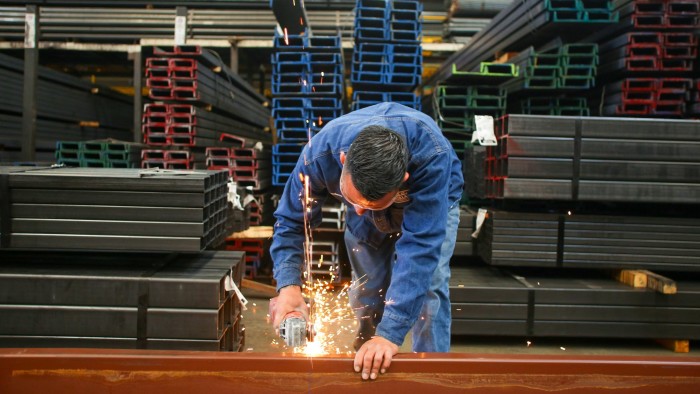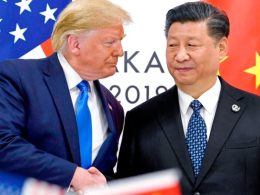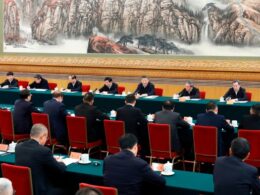Monterrey has grown rich on North American free trade. Industrial parks catering to some of the world’s biggest companies line the six-lane highway to the airport, while the city’s sleek high-rises sprawl across an ever-increasing area between the mountains.
The regiomontanos, as local people are known, are hard-headed and entrepreneurial, or as one executive said: “While others cry, we sell the handkerchiefs.” Some admire President Donald Trump’s pro-business, anti-woke line.
So Monterrey’s business leaders believe they can weather Trump’s threats to upend the free trade deal linking Mexico, the US and Canada.
Julio Escandón, chief executive of Banco Base, a local bank, said he had not seen a drop in demand for loans. “What I pick up from conversations with business people who work with foreign companies here . . . is that it’s not going to happen,” he said of Trump’s threats of across-the-board tariffs.
Tariffs targeted at particular sectors were possible, he added, “but an across-the-board 25 per cent tariff . . . is unsustainable in the medium to long term”.
Trump announced tariffs of 25 per cent on all Mexican and Canadian imports on February 1, then paused the move for a month after the leaders of both countries promised at the eleventh hour to beef up border security and crack down on drug trafficking.
On Sunday, Trump made a fresh move, pledging a 25 per cent tariff on all steel and aluminium imports, including from Mexico.
Yet business leaders in Monterrey, where manufacturers make everything from Lego to televisions to car parts for export, are quietly confident that the economic logic of North American free trade will prevail.
Mexico is now the US’s biggest trading partner, exporting $500bn worth of goods north last year.
Mexican chief executives declined to be quoted by name on the sensitive topic of US tariffs, preferring to defer to the government while negotiations with Washington continue. But a business lobbyist in the city noted: “We’ve been through a Trump administration before.”
She recalled that during his first term, the US president vowed to close the Mexican border, then relented when Mexico took the tough line he wanted on migration. “We will have frights from time to time, but in the end Mexico is the country which matters most to the US, and Trump knows that.”

Emilio Cadena, chief executive of Prodensa, which helps foreign companies set up manufacturing in Mexico, said that while some companies were in “wait and see” mode, most investors were pushing ahead with their plans. Certain companies, he said, were thinking of moving manufacturing to the region and investing in both the US and Mexico. “Mexico is an enabler of the re-industrialisation in the US,” he said.
One speaker at a recent US Chamber of Commerce conference in the city even joked that “Trump was the best president Mexico ever had”, referring to the relatively robust investment Mexico attracted during his first term, said a person who attended.
Trump’s early moves in his second term have still prompted a degree of concern. “Nobody expected Trump to go this close to imposing tariffs,” said a Monterrey financier, noting that the US president went as far as signing the executive order to implement duties, before giving Mexico and Canada a temporary reprieve.
Juan Carlos Baker, a Mexican former trade negotiator, said Trump’s focus in his second term talks with Mexico “is different to the first term, when Trump wanted to destroy Nafta”, the North American Free Trade Agreement that was replaced by the current USMCA deal.
“Now tariffs are a punishment, and I fear that in the future the level of tariffs will depend on whether Mexico does what the US wants on migration, security and fentanyl. This can be very subjective.”
Some executives said their businesses would survive even if Trump eventually imposed higher tariffs on Mexico. Labour costs in Texas are several times higher than those in Mexico, which Mexicans believe gives their country an enduring competitive advantage.
The average manufacturing wage in Nuevo León state, where Monterrey is the capital, is around $33 per day, according to state government data; in Texas it is about $292 a day, according to the Federal Reserve Bank of St Louis.
“All the US business people are lobbying Trump not to tear up their supply chains,” said the Monterrey financier. “They are our allies.”

Not everyone shares the optimism of the regiomontanos. Some 900km further south in Mexico City, those immersed in politics are worried. “Just because there’s strong economic logic to maintaining North American free trade doesn’t mean that’s what Trump will do,” said one former Mexican official. “Populists don’t always follow economic logic.”
Some Monterrey business people believe that US pressure on Sheinbaum for results against the murderous drug cartels could help Mexico if it improves security. But their main concern is convincing Trump that he should see Mexico as an ally in the fight against his biggest enemy, China.
Banco Base’s Escandón believes Trump will end up being swayed by the argument that China is a much bigger problem for the US. US companies that have the president’s ear, such as Elon Musk’s Tesla, know that “the only way to compete with China is to put a plant in Mexico”, he said.
Máximo Vedoya, president of the Caintra industry lobby in Nuevo León, said Trump was right to raise the issue of unfair Chinese trade competition.
But he added: “Why take action against Canada and Mexico when the common enemy is China? Integrated North American value chains are the best way to combat China. If we lose that supply chain, the jobs won’t go to the US, they will go to countries like India, Vietnam and Malaysia.”
Data visualisation by Alan Smith and Ray Douglas
Source link










